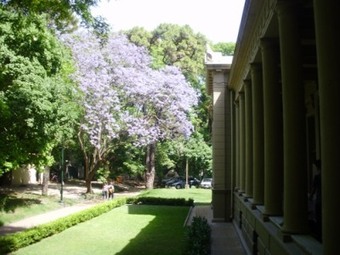
SEMINARIOS DEL IFLP y DEL DEPARTAMENTO
MARTES 14 de FEBRERO – 11 hs
AULA CHICA
TÍTULO: "RELATIVISTIC ELECTRON GAS: A NATURAL METAMATERIAL"
EXPOSITOR: C. A. A. de Carvalho
Instituto de Física, Universidade Federal do Rio de Janeiro - UFRJ, Rio de Janeiro-RJ, Brazil
Centro Brasileiro de Pesquisas Físicas – CBPF, Rio de Janeiro-RJ, Brazil
e-mail: aragao@if.ufrj.br; aragao@cbpf.br
Resumen: The electric permittivities and magnetic permeabilities for a relativistic electron gas are calculated fromquantum electrodynamics at finite temperature and density as functions of temperature, chemical potential, frequency, and wave vector. The polarization and the magnetization depend linearly on both electric and magnetic fields, and are the sum of a zero-temperature and zero-density vacuum part with a temperature and chemical-potential-dependent medium part [1]. In the nonrelativistic limit, results reproduce the Lindhard formula. In the relativistic case, results unambiguously indicate that the relativistic electron gas is one of nature’s candidates for the realization of a negative index of refraction system. Maxwell’s equations in the medium yield the dispersion relation and the index ofrefraction of the electron gas. Moreover, a discussion is presented of applications to condensed-matter systems leading to good agreement with experimental measurements of the plasmon energy in graphite and tin oxide, as functions of both the temperature and wave vector [2]. We also derive expressions for the real and imaginary parts of the EM responses, and relate them to decays [3] into pairs (electron-hole or electron-positron).Present results should be relevant for plasma physics, astrophysical observations, synchrotrons, and other environments with fast-moving electrons.Furthermore, the present electromagnetic response of a relativistic Fermi gas at finitetemperatures could be of potential interest in future plasmonic and photonic investigations.













